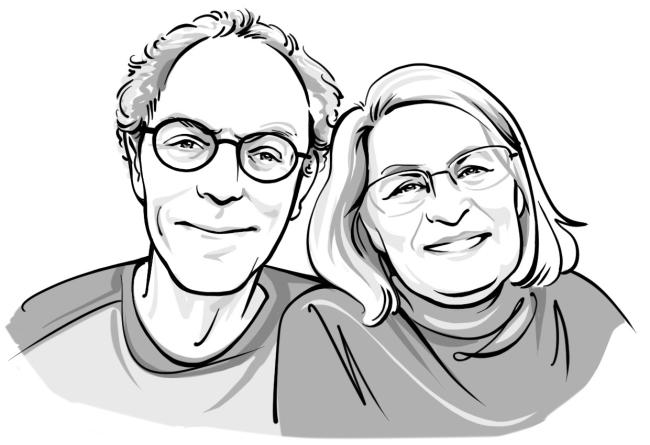Larry and Muriel Gillick
Larry and Muriel Gillick have joined the Yerushe Society, including the Yiddish Book Center in their estate plans. Their support ensures that Yiddish will continue to flourish.

Larry Gillick’s story is typical of many American Jews. His parents, immigrants to Philadelphia from Ostropol (“the same place as [the literary] Hershel of Ostropol,” Larry noted wryly), spoke Yiddish to each other but never taught him the language. Larry attended Hebrew school, which he enjoyed, but when it came to Yiddish, “it never occurred to me to actually take an interest in the language or the culture.”
Like many others, Larry eventually rediscovered Yiddish. Around fifteen years ago he attended a talk by Yiddish Book Center founder Aaron Lansky at the JCC of Greater Boston, which inspired him to take language classes at the Boston Workmen’s Circle and later to start his own reading group, which is still going strong. When he retired in 2019 from a successful career as a computational linguist, he and his wife, Muriel, a specialist in geriatric medicine at Harvard Medical School, thought about how they could give back in a way that would make a difference.
Supporting Yiddish culture stood out. “We were thinking about what organization we believe in, what kind of work we could support, and where our support would really matter,” Muriel reflected. Given their interest in Yiddish literature, both Larry and Muriel were drawn to the Center’s publishing and translation programs. They contributed to the publication of Dineh: An Autobiographical Novel by Ida Maze, translated by Yermiyahu Ahron Taub, and they’re now supporting the publication of a wonderful volume of short stories by Chava Rosenfarb, translated by her daughter Goldie Morgentaler. “There are all these authors who are untranslated but who have so much to say about what Jewish life was like in Eastern Europe,” Larry remarked. “Every time we open a new book I feel like I’m discovering this unknown territory. Maybe I’m also trying to better understand my own family’s background.” Both Larry and Muriel have been particularly interested in the Center’s recent translations of Yiddish literature by women. “I thought there were a small number of great Yiddish writers and they were all men, but that isn’t true,” Larry said. “There is this large world of writing that was unknown to me, and I imagine by including the Center in their estate plans, the Gillicks are ensuring that Yiddish will continue to flourish. “I’ve always liked social history,” Muriel added. “But if you want to understand what life was like and have a full picture, it’s unfortunate to leave out half the population.”
Most of all, the Gillicks hope to have a meaningful impact on the future of the Jewish people. To that end, they are members of the Yerushe Society, which recognizes those who have included the Center in their estate plans, ensuring that Yiddish will continue to flourish. “A lot of Jewish philanthropy goes to mainstream American institutions—the universities, art museums, and symphony orchestras,” Larry said. “But if you care about the Jewish future, those institutions are not going to help. The Yiddish Book Center can make a very important contribution to Jewish survival.”
